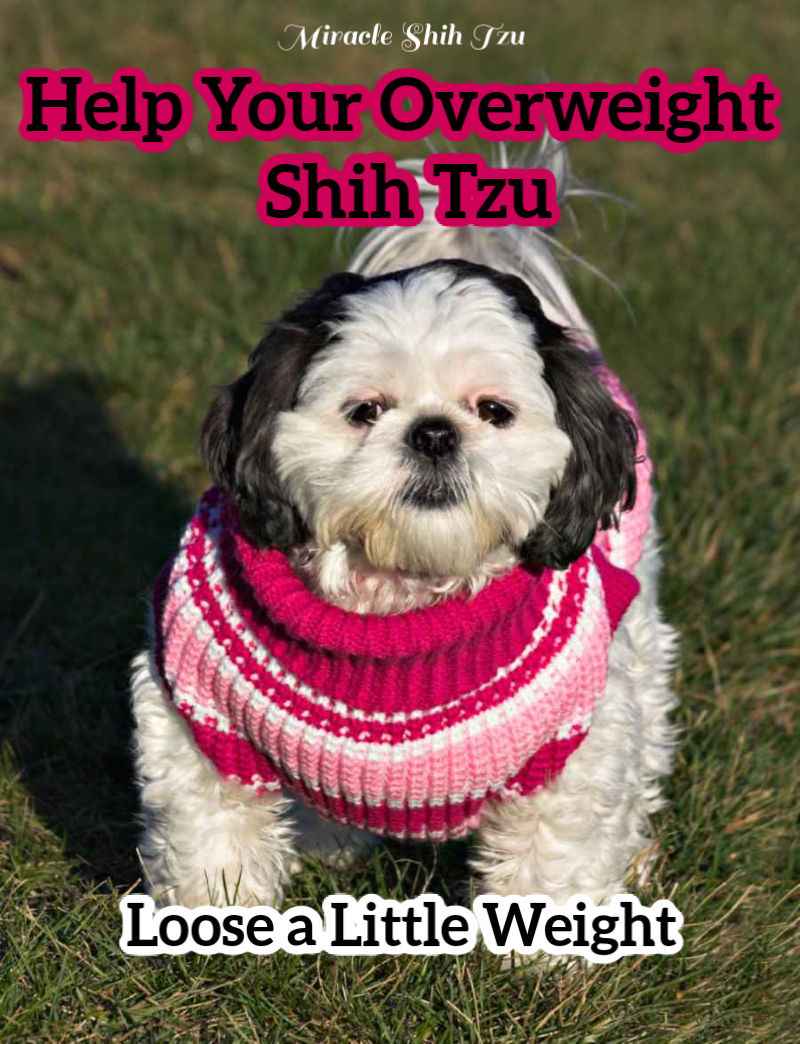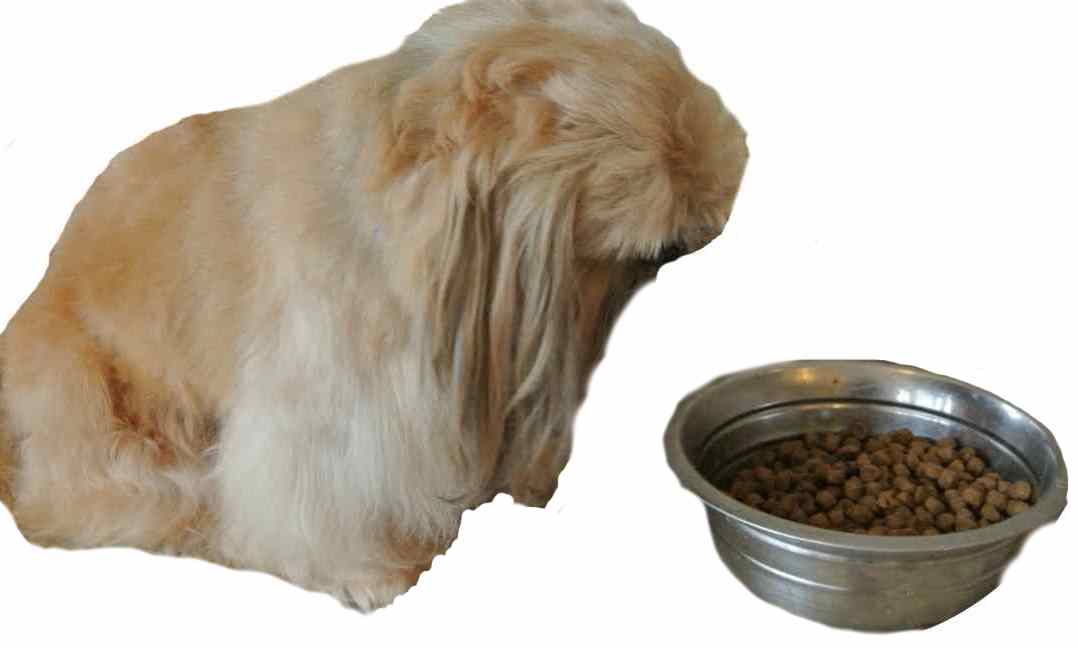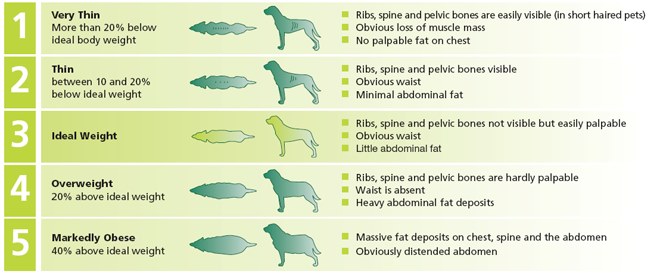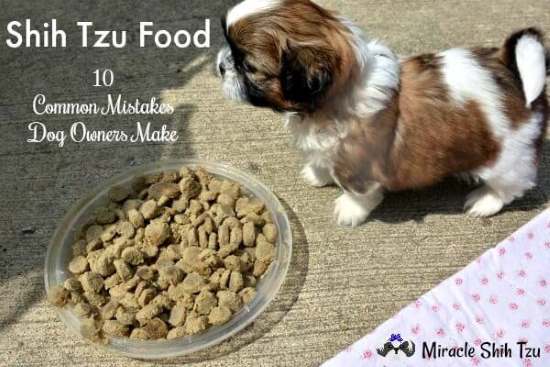Canine Obesity: What You Can Do
By Janice Jones |Last Updated 08-09-2021
Canine Obesity is a major problem in today's dogs. Perhaps you'd like to ignore the situation, but if your Shih Tzu is overweight, you are cheating him out of the chance to live the best possible life. Shih Tzu dogs are not alone in this problem, as many small breed dogs can fall victim.
Overweight Shih Tzu are at increased risk of developing painful conditions like osteoarthritis and life-threatening ones like respiratory, cardiovascular disease, Type 2 diabetes high blood pressure and many forms of cancer.
Did You Know?
5 additional pounds on a 12 pound Shih Tzu is like adding 58 pounds to a 140 pound woman? YIKES!
 Canine Obesity and Shih Tzu Dogs
Canine Obesity and Shih Tzu DogsNo one likes to think about their dog suffering from a life threatening disease. We all know that it is very costly and difficult to treat these diseases once they have been established.
Prevention is much cheaper and easier. But, beyond the cost factor is the health, well-being, and lifespan of the dog.
The bottom line: They need to go on a dog diet and get more exercise.
What is considered to be canine obesity?
If your vet tells you your dog is overweight or obese, what measures are used to determine that diagnosis? A score of 4 indicates a Shih Tzu is overweight, where a score of 5 means the Tzu is obese. a score of 4 means that your Shih Tzu is approximately 10% overweight and if your dog is given a score of 5, then he is above 20% overweight.
Statistics on Canine Obesity
The problem of obesity in our pets is on the rise. According to the the sixth annual National Pet Obesity Awareness Day Survey conducted by the Association for Pet Obesity Prevention (APOP) found 52.5 percent of dogs and 58.3 percent of cats to be overweight or obese by their veterinarian. That equals approximately 80 million U.S. dogs and cats.
Sadly, it’s not just the Shih Tzu, but many other toy breeds that are at risk for obesity. Shih Tzu are not as active as some small breed dogs and one of their favorite pastimes is to cuddle up on your lap. It’s so easy to enjoy their company and their pure relaxed contentment on your lap that you forget they need exercise, too.
Another problem that Shih Tzu owners face is a two edge sword. These dogs learn very quickly. In a weak moment, you give them a great tasting snack and they will never let you forget it. Too little exercise and too many high calorie snacks only lead to one thing. And, canine obesity is a serious health concern.
Your Shih Tzu is at your mercy when it comes to meal and snack time, and the only discipline being exercised in doggie's diet is yours. It is not always easy to look beyond those gorgeous round pleading eyes, but when you give in to your Shih Tzu, you may be doing him more harm than good. Many of our beloved pets are not living out their life expectancy due canine obesity.
As with humans, if your Shih Tzu is overweight then she is taking in more calories than necessary. Period! If your Shih Tzu is overweight and is otherwise healthy then she is eating way too much and/or not getting the exercise she needs.
Causes of Canine Obesity
The causes of canine obesity fall into three separate categories: Medical, Dietary, Lack of Activity
Medical Conditions of Canine Obesity
Sometimes there is a medical reason for a dog gaining weight. If your dog is experiencing weight gain, you should have him examined by your Vet to check for heart, thyroid or other metabolic disorders to rule out a possible medical cause.
Some common diseases associated with weight gain include hypothyroidism and hyperadrenocorticism, or Cushing’s disease. Shih Tzu dogs as a breed are prone to thyroid problems.
Be honest with your veterinarian about how much or how little exercise your Shih Tzu gets, and how often, as well as how much you feed, what and when you feed, and how often you treat. This step requires you to become aware of just how much food the dog is actually consuming over the course of a 24 hour period.
The veterinarian might be able to prescribe a weight reducing diet if other medical problems have been ruled out.
Your Dog's Diet as a cause of Canine Obesity
"Lola won't stop pestering me unless I give her a treat and she won't settle at night unless she gets his special sausage treat." Good for Lola!
She has successfully learned how to manipulate this owner into a treat for herself. Talk about negative conditioning here. Lola’s owner hasn't trained her properly to have some manners and instead Lola has managed to train her owner. She knows exactly what being a nuisance will do—it will get her a treat and eventually the pounds start to mount on her.
There is no shortage of dog treats on the market today. Just visit a supermarket or pet store and you will notice that there is often an entire isle devoted to treats alone. Giving a dog a treat without making them work for it not only hurts the relationship, it undermines any training you are doing and it puts on extra pounds.
Dog treats are only part of the problem. As humans, we like to snack, especially while watching TV. If our favorite canine is snuggled closely, it’s very easy to give him the same foods you are eating without paying much attention to the amount your Tzu is consuming.
Eating Problems as a cause of Canine Obesity
One of the most common excuses for overweight Shih Tzu in this country goes something like this:
"Charlie won't eat dog food."
So, then what does Charlie eat? You got it, table scraps and whatever it wants. Here we are not describing a well-researched home cooked diet, just what’s left over when the people finish eating.
Oftentimes overweight dogs also become ones who are excellent at begging at the table. It only takes a couple of times when an owner is in an overindulgent mood to get the begging habit started. Once little Charlie, the Shih Tzu has succeeded in training the owners to give him what he wants, then the habit gets entrenched in both the dog and the owner’s mind.
As we all know, habits are hard to break. Sadly, though the dog is paying the price for it physically. Shih Tzu are much more likely to prefer food from his owner’s hands then a dog bowl. Here again, the dog is not getting the proper nutrition, but has learned still another bad habit: Begging.
Lack of Appropriate Exercise as a Cause of Canine Obesity
It goes without saying that the body will store any excess calories consumed that are not used. Some Shih Tzu dogs can become great couch potatoes especially if their owners are relatively inactive.
Most Shih Tzu dogs are active though, and will follow their owners around the house. Many will show sudden bursts of activity, tearing through the house as if on a joy-run and will do the same thing if allowed to do so in a securely fenced yard.
For all the others, a couple daily walks will be necessary to maintain a proper walk. Even those dogs who are active indoors, enjoy a walk or two each day. In fact, a couple of 1/2 hour walks daily may be all that is needed to bring an over weight dog back into shape.
But there likely more you will want to know, so keep reading.
 Canine Obesity
Canine ObesityJust How Many Calories Does the Dog Consume?
We think about dog food normally when we try to determine how much our dog is eating, but there are many other factors to consider.
- Of course the calorie content of the dog food is important and how many calories are contained in the daily meals.
- Consider treats for training? How many calories are we adding here?
- Does your dog have any supplements that she takes regularly--nutritional vitamins and minerals? How about an extra squirt of Omega 3 Fatty Acids in the form of Fish or Salmon Oil? There are more calories there than you might think?
- Does your dog use dental chews daily? Those add to the calorie intake.
- Other forms of chews can also add some calories if they can be digested.
- Table Scraps? A green bean here, a bite of chicken, some left over sweet potatoes? They are all nutritious foods for your dog, but they add to the total daily calories.
- Does your dog need to take a pill or two everyday? Do you hide that pill in some sort of food or a pill pocket. That food adds to the total daily calories.
- Does your dog go out and scavenge? Historically dogs were scavengers. We might not like to think about it, but everything the dog consumes has the potential to add calories.
Know Your Dog Food and How it Can Help Combat Canine Obesity
Check the label to determine how many calories are in each cup of dog food. The calorie count varies between blends and between brands.
Commercially prepared dog foods that are intended for inactive dogs or those who want to loose weight will typically have more carbohydrates in the form of non-digestible fiber. The thinking behind these diets is that with larger quantities of fiber, the dog will consume the same calories but fill satiated and not want more food until the next meal.
These weight loss diets will also be lower in fats but still maintain the protein in adequate amounts. The best way to determine what is right for your dog is to have him examined by a veterinarian and ask for diet recommendations. While many commercial diets are available over-the-counter, some prescription diets only available through a veterinarian may be another option.
Treatment Options for Canine Obesity
Get a baseline weight
Before you decide to put little Charlie on a diet, check with your veterinarian. Get an accurate record of his weight and determine the ideal weight for his breed. The standard for the Shih Tzu Breed states that they should weigh between 9 and 16 pounds. Their weight should be proportional to their overall size.
Determine Where Those Daily Calories Originate
Determine where his daily calories are coming from (dog food, treats, dental chews, table scraps, and additional food items used to administer pills). A quick and honest analysis might surprise you. Perhaps you didn't initially calculate those extra calories that come when you wrap your dog's medicine in a little bit of cheese or peanut butter. Does your dog enjoy a daily dental stick? Great for the teeth, but these too add to the total daily caloric intake.
Find out if others are feeding your dog behind your back. (kids, neighbors, room mates, scavenging). You might be very diligent in curbing your dog's extra calories, but are your efforts being sabatoged by well meaning family, friends, and neighbors?
How to Calculate the correct daily calorie intake for Your Dog
Your veterinarian will be able to tell you how many daily calories your dog can consume and still begin to lose weight. This amount must include all the extra table scraps, treats and doggie cookies you are now feeding. If you'd like to try this yourself, here's a quick formula:
Calculate the Daily Resting Energy Requirement (RER)
STEP ONE:
First you need to weigh your dog and convert the weight in pounds into kilograms:
Here is an example:
10 pounds = 4.54 kg
12 pounds = 5.44 kg
14 pounds = 6.35 kg
16 pounds = 7.26 kg
18 pounds = 8.16 kg
REP = 30 x (current body weight in kg) + 70 = _____kcal/day
So, for a Shih Tzu weighing 18 pounds, 30 x (8.16) + 70 = 314.8 kcal/day
STEP TWO
Calculate the daily energy requirement (DER)
DER = (RERx _____activity factor)=_____kcal/day For an activity factor use 1.6 for inactive neutered dogs and 1.8 for inactive in-tact dogs.
So as an example, an 18 pound Shih Tzu who is neutered and relatively inactive,
314.8 x 1.8 = 566.65
STEP THREE
Calculate the number of calories needed to achieve a weight reduction of 1 to 2 % per week:
DER x 60-80% = _____Total # of kcal/day
566.65 x 60%= 339.99 or 566.65 x 80% = 453.32 kcal/day
STEP FOUR
Determine the kcal/day rate on your dog food's bag label. This will be different from food to food.
Are You Fluent in Reading Dog Food Labels?
Next you will want to become fluent in reading dog labels to find the best dog food that Charlie will eat. The easiest way to manage a diet is to remove all treats entirely and then substitute them for something healthy and low calorie such as carrots, celery, broccoli or asparagus. Many dogs love the crunchy feeling that accompanies nibbling on raw veggies.
What's in that Dog Food You're Feeding Your Shih Tzu?
First take a good hard look at the food you are feeding. The FIRST ingredients present in the bag of food should be MEAT or meat products, NOT grains like corn. Look at the first five ingredients and compare two or more brands.
Premium or higher quality dog foods will have more meat, fish or poultry as the main ingredients. Shih Tzu dogs do much better on commercial diets that do not contain the grains, corn, wheat or soy.
If you're wondering about low calorie diets for dogs, you can purchase them, but many vets don't like to recommend them as they have very restricted fat levels. When they produce dog foods with reduced fats, the carbohydrates are increased.
When dogs ingested additional carbohydrates, their bodies must produce extra insulin. What happens is that the extra insulin production tells the dog’s body to store the unused calories as fat. It becomes a vicious cycle.
Behavioral Modification: Yours and His
In the meantime, if he begs – do NOT give in. If he has finished his bowl of food and looks expectantly at you for more, give him a bowl of fresh water instead.
If you must give him something when he begs, offer him a couple pieces of his normal kibble. Sometimes this works because it has your scent on the food. If he refuses, shrug your shoulders and walk away. At the end of two weeks, weigh him again. If Charlie has lost some weight, great, then stick to this schedule. If he hasn't lost any weight, reduce his intake and also find out if someone else in the house is sneaking treats to Charlie.
Doggie Diets are only successful if everyone in the household is on the same page.
Exercise and Canine Obesity
Exercise is important especially for dogs that are overweight. To benefit from a walk, however, requires you to pick up the pace. A casual stroll stopping every few minutes to sniff is not going to burn off many calories. A short brisk walk is better for this breed than a long leisurely stroll.
Play Fetch: Not all Shih Tzu dogs enjoy this game, but if yours does, by all means play it daily. Your Tzu will get plenty of exercise and you will have some great bonding time with him as well.
Does your Tzu get those bursts of energy where he runs wildly in a room or between rooms? If possible, encourage this, but don't overdo it. Remember, Shih Tzu dogs are a brachycephalic bred and as such cannot tolerate as much as their cousins with long noses.
Always offer plenty of cool fresh water during and after exercise and if the weather is especially warm, limit exercise times to early morning or evening when temperatures drop.
Set Realistic Goals as a Treatment for Canine Obesity
We all love our pets and want what is best for them. Sometimes we tend to kill them with our kindness by providing unhealthy diets. There are far better ways for us to show our love than with too much food. Your pet will almost certainly enjoy spending more time on walks or playing games with you than he or she will when eating alone.
There are plenty or nutritious foods which have loads of doggie palate appeal out there, so you should never feel like Charlie is missing something by not dining at the family table.
References and Further Reading on Canine Obesity
"Hi, I'm Janice Jones, a former veterinary technician and Shih Tzu expert with over 40 years of experience with the breed. Through Miracle Shih Tzu, I combine my medical background and extensive breed knowledge to provide reliable, practical advice for Shih Tzu owners. My mission is to help you give your Shih Tzu the happiest, healthiest life possible through evidence-based information and real-world solutions. Whether you're new to the breed or a seasoned owner, you'll find trusted guidance here for all aspects of Shih Tzu care.
I hold an undergraduate degree in Psychology with a minor in biology, Early Childhood Education, and Nursing, and a Master's in Mental Health Counseling.









